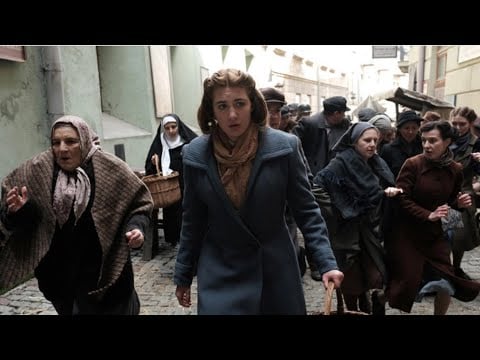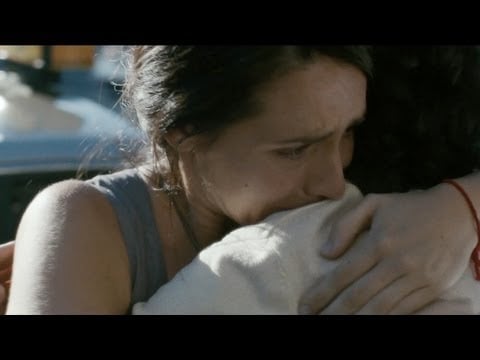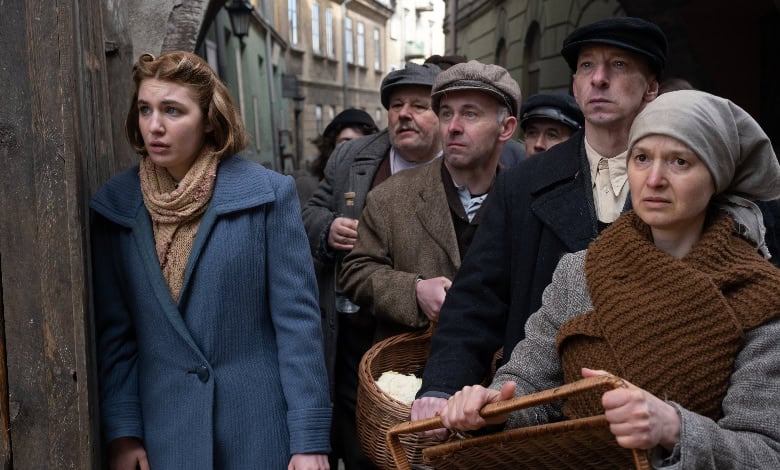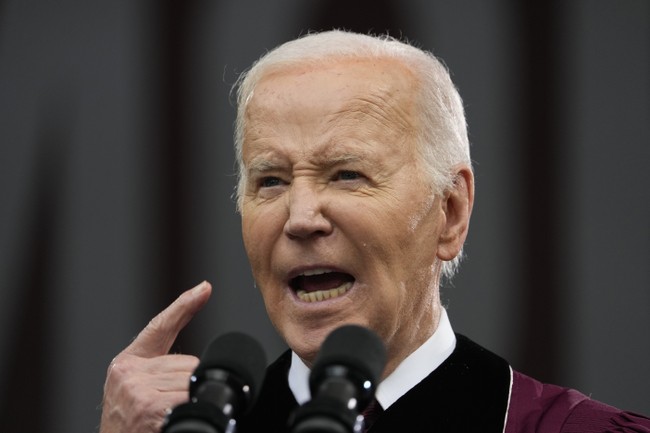Why was it necessary to make “Irena’s Vow” in this day and age?
Must we have yet another drama about the Holocaust, especially another flirting with “Gentile Savior” cliches?
So much about the topic has already been said on film. Did we really need to make yet another one when there are already so many others out there, both dramatizations and documentaries alike?

Sadly, yes.
Antisemitism and other bigotries continue to choke us in what is supposed to be mankind’s most enlightened era.
Look at what happened in Israel on October 7 (I saw the movie at the Windsor International Film Festival just three weeks after those terrible events) and what has been raging in Ukraine for the past three years. Look also at news coming from China, Turkey and Azerbaijan, even if they don’t get the headlines they deserve.
Maybe even peer out your window, especially if you live in a college town or major city. Some are demanding a ceasefire in Gaza while calling for the destruction of an entire nation.

Even take a hard glance at elected representatives who refuse to take a stand against Hamas’s barbarism and Putin’s butchery. There are still stories from nearly a century ago that have yet to be told but must be recounted for the lessons they impart about our present crises.
We will always need to be reminded over and over again not just of this disgraceful chapter in human history, but also of those brave souls who defied evil and put human life ahead of all else.
Irena Gut (later Opdyke) was one such soul.
A nurse living in Tarnopol in eastern Poland during the Nazi Occupation, she hid 12 Jewish factory workers in the cellar of the home of Wehrmacht officer Eduard Rugemer, for whom she was working as a housekeeper. He allowed her to work for him after noting her German-sounding name and “Aryan-looking” appearance meant she probably wasn’t “too Polish” for the Gestapo.
When Rugemer found out the truth, she forced Gut to become his mistress under the threat of informing his superiors of her actions. Having no choice, Irena went along with his blackmail, but as depicted in the film, she in turn forced him to confront his conscience and question his role in the Nazi regime.
“Irena’s Vow” recounts this harrowing story with sensitivity but also an appropriate sense of urgency and desperation. Sophie Nélisse, who is quickly maturing into a fine actress, gives a quiet, low-key performance suiting both the character of the real-life person she plays as well as the dire situation she found herself trapped in.

Ten years earlier, the teenage Nélisse also gave a fine performance in the similarly-themed “The Book Thief,” but the much smaller “Irena’s Vow” is a better movie. The latter more honestly deals with the evils of the era.
As Rugemer, Dougray Scott is better than usual. He still tends to overdo it in certain scenes (this habit nearly killed his once-promising career), but this time he’s been able to add some nuance to his performance.
He finds humanity in his characterization, just as the real-life Rugemer eventually found it in himself.
Director Louise Archambault is part of an exciting new generation of Quebecois filmmakers that includes Xavier Dolan and Denis Villeneuve of “Dune” fame, She hasn’t received their level of international recognition yet, but it will likely come calling.
Her work is suffused with a sort of Bressonian humanism and genuine empathy that is rarely found in contemporary cinema, at least in North America. Archambault’s previous film “Gabrielle” was my favorite movie of 2013, a beautifully acted and masterfully directed story of a young woman with Williams Syndrome struggling to achieve independence.

The same year as “Irena’s Vow” she also directed “One Summer,” a gentle comedy about a parish priest who brings the local homeless with him on a much-needed vacation. Her films don’t merely take a compassionate look at the less fortunate but are commentaries on the very nature of compassion itself.
She reveals the complexities and difficulties that arise when we assist the less fortunate or those in desperate need of assistance (“Gabrielle” is as much about the family members and volunteers trying to help the title character as it is about her and others in her situation) yet suggests things will work out for the best when we ultimately do what is right.
View this post on Instagram
There is relatively little violence in “Irena’s Vow,” yet what we see is brutal enough to convey the horrors of the era. Early on, Irena’s decision to resist is solidified when she witnesses a Nazi soldier wrench a Jewish baby from its mother’s arms, throw it on the ground and then stomp it to death.
This horrifying scene is based in truth, but the reality was even more terrible: as Archambault related at the screening I attended: in real life the soldier tossed the child in the air and then shot it several times before the body hit the ground.
Later, an entire Catholic family, including the children, is executed by public hanging to warn others what will happen if they also defy the Occupation by sheltering Jews in their homes. We feel at every moment the danger of being found out that Irena and her charges lived under, an authenticity further brought on by the filming conditions.
The production was originally planned to shoot in the city of Tarnopol, now Ternopil in the Ukraine, but for obvious reasons, they were unable to do so. So filming took place in Lublin, which is still close enough to the Ukrainian border that filming was frequently interrupted by the sounds of missiles striking and bombs going off.
The key scene in the film is when Irena, no doubt reminded of the baby’s murder, refuses to provide for an abortion when one of the women in hiding is found to be pregnant. It’s not just her Catholic faith that prevents her from doing so: as she explains, if she allows this procedure to go through, and prevents another Jewish life from entering this world, she will be complicit in Hitler’s genocidal goals.
This scene inspired the most discussion and argument among the audience I attended, some of whom thought the movie was putting forward an explicitly anti-abortion message. Archambault explained that while such a pro-life viewpoint is not her own, it was more important to tell the story in a way that reflected Irena Gut’s experience as well as to be as truthful as possible to the historical record. The recreation of this moment was necessary to convey the depth of Irena’s commitment to her cause.
Archambault explained that while such a pro-life viewpoint is not her own, it was more important to tell the story in a way that reflected Irena Gut’s experience as well as to be as truthful as possible to the historical record. The recreation of this moment was necessary to convey the depth of Irena’s commitment to her cause.
Later, she will seemingly disregard her Church’s rules regarding the sanctity of marriage, but although this decision tears her up, she must do so to respect her more important dedication to the sanctity of human life-the true vow of the film’s title.
Although Israeli-Canadian screenwriter Dan Gordon (adapting his play to the screen) has written some of the better “faith-based” movies of recent years, this film does not fall into that narrow category. The Christian beliefs of Irena Gut may be essential to her actions and motivations, but the screenplay instead emphasizes universal values regardless of one’s belief system.
Still, there is one brilliantly directed and edited scene that demonstrates the dichotomy between true faith and those who have perverted religion in the name of evil. Upstairs in Rugemer’s home, a raucous and vulgar Christmas party goes on, the drunken revelers oblivious not just to the refugees huddled below but to the fact that they’re celebrating the birth of a Jewish child.
Meanwhile, Irena looks on as the lighting of the menorah simultaneously takes place in the cellar, the makeshift congregants softly singing their Hannukah blessings as one candle after another is slowly lit. At the end of the ceremony, the leader of the prayers gently and sincerely tells their guest “Irena…Merry Christmas,” an acknowledgment of their shared humanity as well as thanking her for acknowledging theirs.
Which tales of the Righteous Among the Nations should be told next?
Given the current world situation, I suggest that any filmmaker wishing to tell more such stories look at those of Mohamed Helmy, Khaled Abdul-Wahab and Abdol Hossein Sardari for future dramatizations. Each also defied religious differences and cultural tribalism to save human lives and would serve as important examples for contemporary audiences all around the world.
If only we didn’t so desperately need to tell their stories at this point in time.
The film’s final shot is of the real Irene Gut-Opdyke reunited with the now-grown up Roman Haller, the child she insisted be allowed to be born.
A.A. Kidd is a sessional university instructor in Canada who proudly volunteers for the Windsor International Film Festival. He appreciates classic movies, hard science fiction and bad puns.
The post ‘Irena’s Vow’ Speaks to Our Tragic Times appeared first on Hollywood in Toto.


